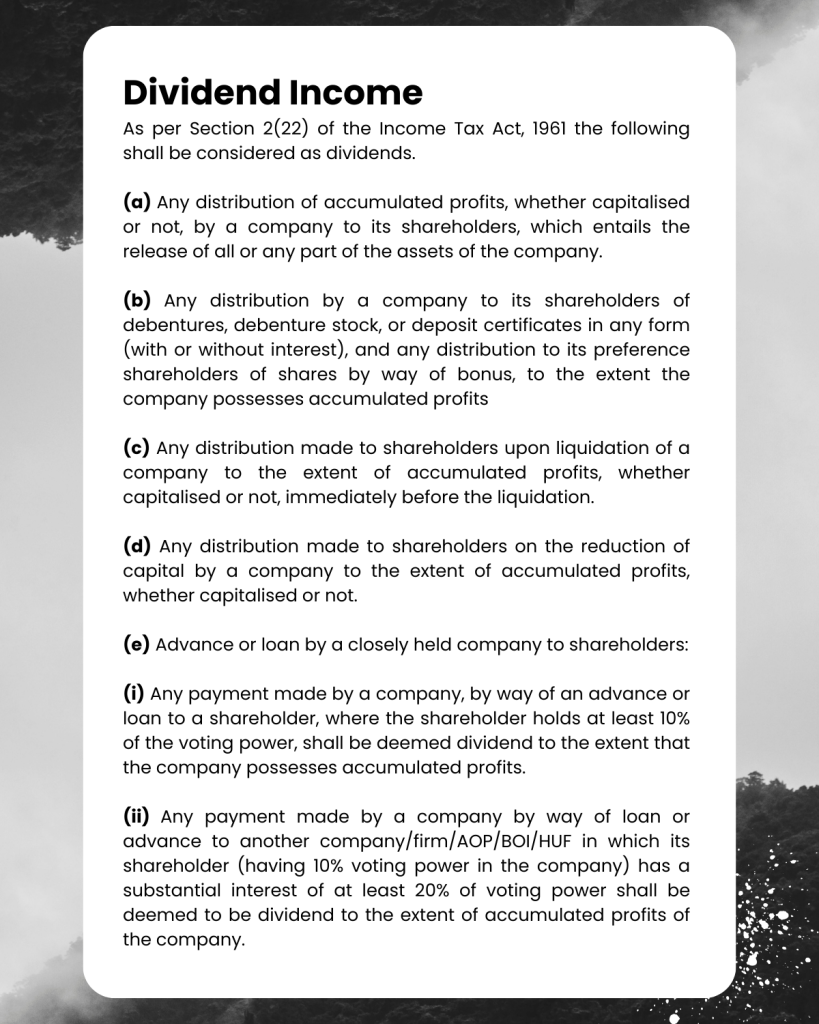
Dividend is an income we get from the capital investment from shares or mutual funds. From the company’s point of view, it is the distribution of profits to its owners.
This income earlier in India received by investors from shares or mutual funds was not taxable in their hands. Dividends exceeding ₹10 lakh in a year are subject to taxation for the investors. This was covered under the now-removed sections 10(34) and 115BBDA. Furthermore, companies were paying a Dividend Distribution Tax (DDT) under Section 115-O. DDT was eliminated by the Finance Act, 2020.

The investors and shareholders from 1st April 2020 are liable to tax on dividend income as applicable slab rates. In the same vein, companies and mutual funds were not require to pay DDT on the distribution of dividends.

| Assessee | Dividend Income | Rate of Tax |
| Resident | Dividend from Domestic Company | As per applicable slab rates to the Assessee |
| Non-Resident/Foreign Company | Dividend from Bonds of Indian company or GDR acquired in Foreign Currency | 10% |
| Non-Resident/Foreign Company | Dividend Income on shares purchases in Indian/Foreign currency | 20% |
| Non-Resident/Foreign Company | Dividends from units of mutual fund purchased in foreign currency as per Section 10(23FD) or of UTI | 20% |
| Overseas Financial Organisation | Dividends from units of mutual fund purchased in foreign currency as per Section 10(23FD) or of UTI | 10% |
| Foreign Institutional Investor(FII) or Specified Fund | Dividends from Securities Other than Units of UTI & Mutual fund. | FII-20% Specified fund-10% |
Any additional expenses like commission etc are not allowable. The amount of deductions can be avail is the lower of:
Advance Tax provisions shall apply to taxpayers having a tax liability of more than ₹ 10,000.
Taxpayers whose tax liability exceeds ₹10,000, including earning from dividends, must comply with Advance Tax provisions.
If failure to pay Advance Tax can result in interest and penalties for the taxpayer.
Taxpayers with projected incomes below the Basic Exemption Limit can submit Form 15G /Form 15H. This form can submit to the dividend-paying company or mutual fund to claim exemption from deducting tax on dividends receivable. Form 15H is for senior citizens and 15G is for others.
Any person earning dividend income has to examine the situation carefully. To ensure that they are complying with all the provisions of the Act.
Yes, dividend income are taxable.
How can I earn dividend income?To earn dividend income :
1. Invest in Dividend-Paying Stocks
2. Choose companies with has a strong history of dividend payments and good financial growth.
3. Hold the shares to receive regular dividend payouts.
4. Monitor the investments and if goes well you will be able to receive cash each year while the stocks may also appreciate in value.
Dividends received up to ₹10 lakh in a financial year are tax-free for individual shareholders. However, this threshold is primarily for the Dividend Distribution Tax (DDT) regime, which has been replaced by a new tax regime.